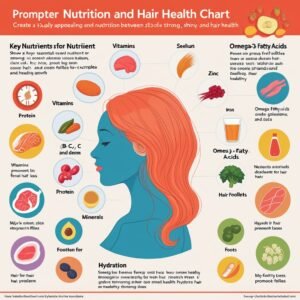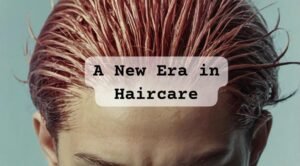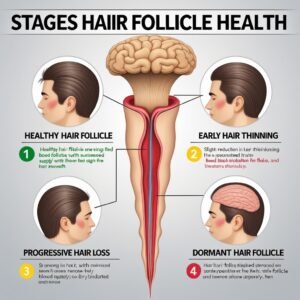Hair loss is a common condition that affects both men and women. It can be temporary or permanent and can vary in severity. Understanding its causes, preventive measures, and treatment options can help manage or reduce its impact.And prevent from hair loss.
Causes of Hair Loss

1. Genetic Factors (Androgenetic Alopecia
This is the most common cause of hair loss, also known as male-pattern or female-pattern baldness. It’s hereditary and typically occurs gradually over time, causing thinning and eventual hair loss, often in specific patterns.
2.Hormonal Changes
Hormonal fluctuations due to pregnancy, childbirth, menopause, or thyroid imbalances can lead to hair thinning. Conditions like polycystic ovary syndrome (PCOS) also affect hair growth.
3. Medical Conditions
Autoimmune disorders like alopecia areata, where the immune system attacks hair follicles, can lead to patchy hair loss. Other conditions such as lupus, diabetes, and anemia can also contribute to hair loss.
4. Medications and Treatments
Certain medications, such as those used for cancer (chemotherapy), arthritis, depression, heart problems, and high blood pressure, can result in hair loss as a side effect.
5. Nutritional Deficiencies
Lack of essential vitamins and minerals, particularly iron, zinc, and biotin, can lead to weakened hair and thinning.
6. Physical or Emotional Stress
High stress levels can lead to a condition called telogen effluvium, where hair enters the shedding phase prematurely.
7. Excessive Hairstyling or Treatments
Frequent use of harsh chemicals, tight hairstyles like ponytails or braids, and excessive heat can cause damage to hair follicles, leading to hair loss.
8. Aging
As you age, hair growth slows, and follicles can become less active, leading to thinner, weaker hair.
Prevention of Hair Loss

While some causes of hair loss, such as genetics or aging, can’t be prevented, certain lifestyle changes and practices can reduce the risk of hair loss
1. Healthy Diet
A balanced diet rich in vitamins (especially B vitamins, vitamin D, and vitamin E), minerals (such as iron, zinc, and magnesium), and proteins can support hair health and growth.
2. Gentle Hair Care
Avoid harsh treatments, excessive use of hair dyes, and heat tools. When shampooing, be gentle with your hair to prevent breakage, and use conditioners that promote strength.
3. Stress Management
Regular exercise, yoga, meditation, and other relaxation techniques can help reduce stress, which in turn may minimize hair loss caused by stress.
4. Avoid Tight Hairstyles
Wearing tight hairstyles like ponytails, braids, or buns can put unnecessary pressure on the scalp and lead to traction alopecia (hair loss caused by tension).
5. Regular Scalp Care
Massaging your scalp with natural oils like coconut oil, olive oil, or castor oil may improve blood circulation and nourish hair follicles
Treatment Options for Hair Loss

1. Medications
Minoxidil (Rogaine): Over-the-counter topical medication that can help stimulate hair growth and slow hair loss. It is available in foam or liquid form.
Finasteride (Propecia): A prescription oral medication for men that works by inhibiting the hormone DHT (dihydrotestosterone), which is responsible for hair loss in male-pattern baldness.
2. Platelet-Rich Plasma (PRP) Therapy
PRP therapy involves drawing a small amount of your blood, processing it to concentrate the platelets, and then injecting it into your scalp to stimulate hair growth.
3. Hair Transplant Surgery
In cases of significant hair loss, hair transplant surgery may be an option. The procedure involves transplanting hair follicles from a thicker area of the scalp to the thinning or balding areas.
4. Laser Therapy
Low-level laser therapy (LLLT) is a non-invasive treatment that uses light to stimulate hair follicles and promote hair growth.
5. Wigs or Hairpieces
– If hair loss is extensive and other treatments aren’t effective, wigs or hairpieces offer a non-medical solution to cover thinning or balding areas.
6. Natural Remedies
Certain herbal treatments, like saw palmetto, rosemary oil, and biotin supplements, are commonly used to promote hair growth. However, the effectiveness of these treatments varies, and it’s essential to consult a healthcare provider before using them.
Conclusion
Hair loss can be a frustrating and distressing experience, but understanding its causes and treatment options can help you manage the condition more effectively. While some causes, such as genetics, cannot be avoided, taking care of your hair, maintaining a healthy lifestyle, and considering medical treatments can improve the chances of retaining or regrowing your hair. If you’re concerned about your hair loss, consulting a dermatologist or healthcare provider is always a good first step to determine the underlying cause and explore appropriate treatments.
By R.Srikanya





